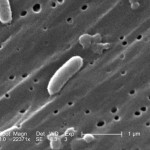Alex Larsen couldn’t make it to the 2010 International Association of National Public Health Institutes (IANPHI) annual meeting. That’s because Larsen, Haiti’s minister of health, was attending to an outbreak of cholera in this impoverished republic.
Larsen was scheduled to speak on NPHIs’ role in disaster preparedness and response. Instead, Scott Dowell, director of the CDC’s division of global disease detection and emergency response, updated attendees about goings-on in Haiti since the massive January 12 earthquake and the recent outbreak of cholera.
The first two weeks after the tremblor and its immediate aftershocks, human and monetary resources were spent on search and rescue, including emergency trauma care, orthopedic surgery and amputations, says Dowell.
The number killed now stands at 200,000. The number displaced: 1.3  million. In addition to an initial lack of safe drinking water, hunger and poor sanitation, anecdotal accounts of diphtheria and tetanus outbreaks circulated. The headquarters housing the ministry of public health was itself devastated when it collapsed, killing most of the minister’s staff who had remained inside.
million. In addition to an initial lack of safe drinking water, hunger and poor sanitation, anecdotal accounts of diphtheria and tetanus outbreaks circulated. The headquarters housing the ministry of public health was itself devastated when it collapsed, killing most of the minister’s staff who had remained inside.
Since the earthquake, Dowell says the water supply has slowly improved with long-term sources coming on line. Efforts to better separate sewage and water are coming to fruition, too.
As far as the cholera outbreak is concerned, this chapter of Haiti’s public health challenges is just beginning thanks in part to Haiti having never before experienced a known cholera epidemic, says Dowell. That is, its population is most likely immunologically naïve to cholera, making people vulnerable to the bacteria’s devastating ways: severe diarrhea, vomiting, and abdominal pain culminating in overwhelming dehydration and even death.
Despite its troubles, Dowell says there’s long-term hope for Haiti. As found in other countries affected by cholera, an aggressive program to provide clean water and keep sewage and water separate, can eventually squelch the bacteria’s rampage—and in the meantime prevent other diseases from taking hold.


